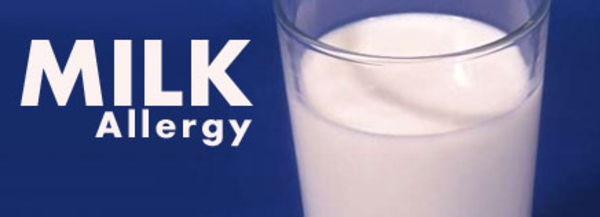Introduction
There is no doubt that it is in infants that milk allergy is mostly observed. Many infants develop milk allergy before they attain the age of three after which most of them overcome the problem and can therefore consume milk and milk products without any allergic reactions. Some however remain with the problem for the rest of their lives.

Milk allergy in infants
Milk allergy is generally explained to be the body’s immune system’s reaction to milk proteins (mainly cow’s milk), proteins which the immune system mistakes to be harmful foreign matters. It is the reaction that occurs during the attack on the proteins that causes allergy. While this explanation is true, the same cannot be said to be the case in infants. This is because infants fed solely on breast milk do not develop any form of allergy. It is only after cow’s milk is introduced alongside breast milk that such infants develop allergy. It is therefore very important that new mothers stick to feeding their infants purely on breast milk and only introduce cow’s milk or any other milk after the infant’s body system has matured. This can help in minimizing the risk of milk allergy development.
Milk allergy symptoms in infants
The fact that infants will exhibit similar milk allergy symptoms as adults is certainly a cause of concern for many new mothers. This is because some of the symptoms are usually serious and life threatening. In most cases, infants will show symptoms within a few hours, days or weeks after introduction of cow’s milk into their diet. Instant symptoms include watery stool, high irritability, vomiting and in some cases refusal to drink milk. Skin rashes and eczema may follow. New parents not properly informed about milk allergy may mistake such symptoms for a disease and there is always the risk of continuing to feed their infants on cow’s milk. This poses a serious risk of aggravating infant’s already precarious condition.
Treating milk allergy in infants
Most milk allergy treatments available for treating infants usually aim at addressing the symptoms rather than the cause. The most effective way of treatment is to avoid feeding infants on cow’s milk or any other type of milk for that matter. Breastfeeding should continue as long as possible.
Coping with milk allergy in infants
Mothers who are not in a position to continue breastfeeding their infants can still ensure that their babies continue to receive the necessary nutrients for proper health and development. This is by stopping to consume any milk or milk products that they can easily pass on to their infants through breast milk. Such mothers need to work closely with nutritionists for advice on the best alternative foods to eat.
Apart from mother’s diet, infant formulas are also available. Not all types of formulas are however appropriate for infants with milk allergy. Mothers therefore need to be careful when shopping for the same. Mothers with milk allergic infants need to avoid milk-based infant formulas and instead go for soy-based formulas that do not contain any cow’s milk. Just in case their infant’s health has deteriorated, they can buy special formulas that contain specially developed ingredients.
Kristina Jegger is a nurse and a mother who has lots of experience with milk allergies and their symptoms (which the Danes call symptomer på mælkeallergi). She has done lots of research on the topic and knows the signs of this particular health problem.
Milk Allergy And Breastfeeding

